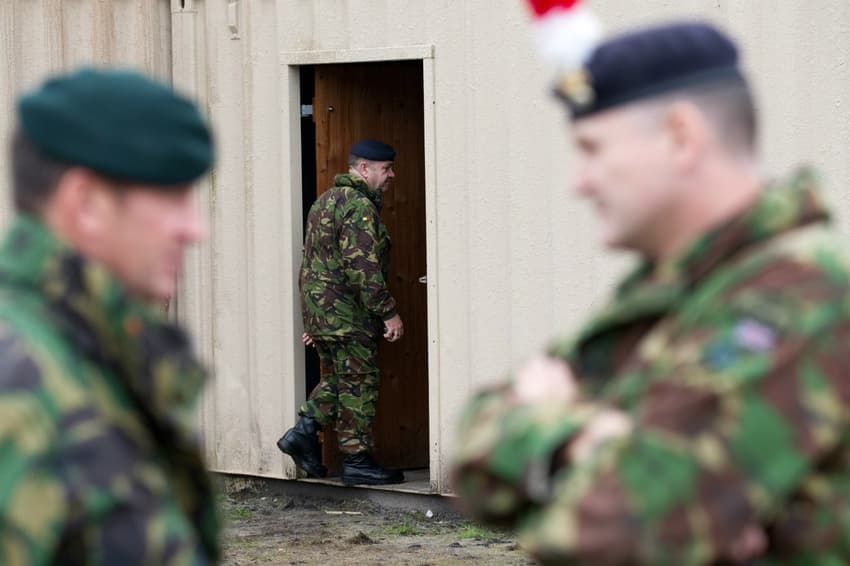Why Britain will keep its army in Germany after Brexit

Britain will keep a small army presence in Germany after it leaves the EU, despite a planned
withdrawal of forces abroad, the UK's defence secretary said on Sunday.
The defence ministry is trying to plug a huge military shortfall, and is cutting the number of troops in Europe by the time the Brexit transition period ends in 2020.
But a full withdrawal of troops from Germany has touched a political nerve in Britain, and the government has been forced to review those plans.
The defence ministry said it would keep around 185 army personnel and 60 defence ministry civilians in Germany once all the other units leave.
Where are British troops in Germany?
The personnel will be permanently based at the 117-square kilometer Sennelager Training Area, part of Paderborn, which provides both UK and NATO forces with a life firing training area.
The facility allows for large-scale manoeuvres to be rehearsed and there is also an urban warfare training centre .
"We will not close our facilities in Germany," Defence Secretary Gavin Williamson told an annual conference of the ruling Conservative Party.
"Instead, we'll keep them open and forward base army units there." Britain remains a key member of NATO, which is refocusing its attention on threats from Russia in the wake of its annexation of Ukraine's Crimea peninsula in 2014.
Why are they in Germany?
The UK's armed forces have had a presence in Germany since the end of World War II. There are currently around 4,000 British military personnel living and working in Germany.
As far back as 2010 former Prime Minister David Cameron announced the early withdrawal of all British forces from German soil by 2020, 15 years earlier than many had expected.
At that time it was said that British forces contributed an estimated €1.3 billion to the German economy each year. There was estimated to be 20,000 soldiers working at 12 bases in North Rhine-Westphalia and Lower Saxony.
Cold War
Meanwhile, Defence Secretary Williamson also called Russia "one of the greatest threats we face today".
"We will not let the Kremlin rewrite the outcome of the Cold War," he said.
The defence ministry also announced plans to invest £1 million (€1.1 million euros) a year to train more than 2,000 cadets annually for a new cybersecurity force.
Williamson said the programme was "the first of its kind in a NATO state".
Comments (1)
See Also
The defence ministry is trying to plug a huge military shortfall, and is cutting the number of troops in Europe by the time the Brexit transition period ends in 2020.
But a full withdrawal of troops from Germany has touched a political nerve in Britain, and the government has been forced to review those plans.
The defence ministry said it would keep around 185 army personnel and 60 defence ministry civilians in Germany once all the other units leave.
Where are British troops in Germany?
The personnel will be permanently based at the 117-square kilometer Sennelager Training Area, part of Paderborn, which provides both UK and NATO forces with a life firing training area.
The facility allows for large-scale manoeuvres to be rehearsed and there is also an urban warfare training centre .
"We will not close our facilities in Germany," Defence Secretary Gavin Williamson told an annual conference of the ruling Conservative Party.
"Instead, we'll keep them open and forward base army units there." Britain remains a key member of NATO, which is refocusing its attention on threats from Russia in the wake of its annexation of Ukraine's Crimea peninsula in 2014.
Why are they in Germany?
The UK's armed forces have had a presence in Germany since the end of World War II. There are currently around 4,000 British military personnel living and working in Germany.
As far back as 2010 former Prime Minister David Cameron announced the early withdrawal of all British forces from German soil by 2020, 15 years earlier than many had expected.
At that time it was said that British forces contributed an estimated €1.3 billion to the German economy each year. There was estimated to be 20,000 soldiers working at 12 bases in North Rhine-Westphalia and Lower Saxony.
Cold War
Meanwhile, Defence Secretary Williamson also called Russia "one of the greatest threats we face today".
"We will not let the Kremlin rewrite the outcome of the Cold War," he said.
The defence ministry also announced plans to invest £1 million (€1.1 million euros) a year to train more than 2,000 cadets annually for a new cybersecurity force.
Williamson said the programme was "the first of its kind in a NATO state".
Join the conversation in our comments section below. Share your own views and experience and if you have a question or suggestion for our journalists then email us at [email protected].
Please keep comments civil, constructive and on topic – and make sure to read our terms of use before getting involved.
Please log in here to leave a comment.